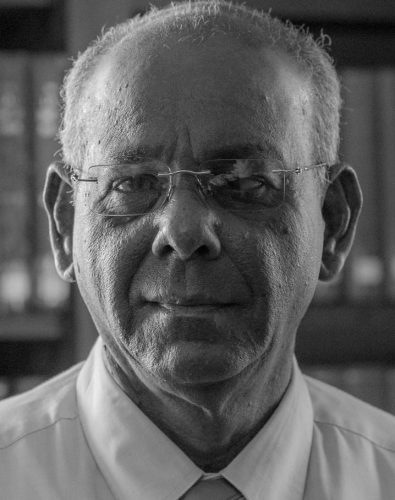It is the President who fixes the date for general elections and given the current mindset of President David Granger there is a risk that he could refuse to dissolve parliament and set a date, according to former Speaker of the National Assembly, Ralph Ramkarran.
The politician and commentator also rapped the “less engaged” international community for its “silence” on the “constitutional violation by government.”
“…with Guyana not even qualifying for a statement from an acting Deputy Assistant US Secretary of State, or a Junior British Foreign Office Official, suggests the relative lack of importance attached to constitutional violation by government. The government knows that the tepid diplomatic statements so far are mere taps on the wrist that can be safely ignored,” Ramkarran, a co-founder of the political party ANUG and former Speaker of the National Assembly, wrote in his Sunday Stabroek column yesterday.
He made the statements in light of the Caribbean Court of Justice (CCJ) confirming the validity of the no-confidence motion passed against the APNU+AFC government and the actions of the David Granger-led administration since then. Ramkarran pointed to recent comments by Granger that “the President cannot tell the Elections Commission when elections must be held neither can the courts,” as well as that the CCJ issued no coercive orders and therefore the government is not in contravention of the orders of the court or of the Constitution.
“On this mindset, the danger remains that the President could still refuse to dissolve Parliament and fix a date for elections,” Ramkarran wrote.
He highlighted Article 61 and 62 of the Guyana Constitution with the former providing that, “An election of members of the National Assembly under article 60(2) shall be held on such day within three months after every dissolution of Parliament as the President shall appoint by proclamation…” and the latter stating that, “Elections shall be independently supervised by the Elections Commission in accordance with the provisions of article 162.”
“According to the Constitution, therefore, the President, not GECOM, fixes the date for elections. GECOM’s responsibility is only to ‘independently supervise’ the elections,” Ramkarran contended.
He noted that while the president claims that because the CCJ issued no coercive orders, the government is not in contravention of the orders of the court or of the Constitution, the CCJ has ruled that the National Assembly properly passed a motion of no confidence in the Government on 21 December, 2018 and upon the passage of the motion, the clear provisions of Article 106 immediately became engaged.
Article 106(6) states, “The Cabinet including the President shall resign if the Government is defeated by the vote of a majority of all the elected members of the National Assembly on a vote of confidence.”
Article 106(7) adds, “Notwithstanding its defeat, the Government shall remain in office and shall hold an election within three months, or such longer period as the National Assembly shall by resolution supported by not less than two-thirds of the votes of all the elected members of the National Assembly determine, and shall resign after the President takes the oath of office following the election.”
Said Ramkarran, “…it is as clear as day that it is the President who fixes the date for elections, that Article 106 has become immediately engaged, that elections must be held by September 18, that GECOM has no role in these matters, and that the Cabinet must resign.”
Imaginative interpretations
According to the former Speaker, by his “imaginative interpretations,” Granger is transporting Guyana into a dystopian reality.
Meantime, he highlighted the international community’s reaction so far to the matter. Ramkarran recalled that the prorogation of the National Assembly in November 2014 by the PPP/C government, which is provided for in the Constitution, and which had occurred in identical circumstances in Canada, attracted forceful and repeated condemnations by the US, Canada and EU.
“Now, the refusal of the Cabinet to resign and the failure to fix a date for elections have been met with silence,” he wrote.
“With what appears to be a less engaged international community, it is not known if much weight will be applied to seeking adherence to the Constitution, now that a Chair for GECOM has been agreed. If not, the Government will have free (rein) to rely on its own distorted interpretations,” Ramkarran said.
As reported by Stabroek News on January 12, 2015 the UK had issued an explicit warning to the PPP/C government over the prorogation of Parliament on November 10, 2014 by then President Donald Ramotar.
Then High Commissioner Andrew Ayre had said that there was growing concern over the suspension of Parliament by the Ramotar administration and that Guyana was at risk of being referred to the Commonwealth Ministerial Action Group.
“There is discussion about countries of concern in the Commonwealth every few months….Guyana is moving into a category of concern for the Commonwealth. That is quite clear from discussions that take place in London,” Ayre had said.
He added that the November 10, 2014 suspension of Parliament by Ramotar was a clear breach of the Guyana Constitution and the Commonwealth Charter. “These things matter. The UK and other governments don’t sign the Commonwealth Charter…and then just put them to bed,” he said while calling on Guyana to fulfill its international obligations.
Ayre reiterated the UK’s call for the administration to resume Parliament without delay or lay out a timeline for the resumption of parliamentary democracy. “Guyana could be subject to a critical review because of breaches of the Commonwealth Charter,” he had said.
He added that Britain’s aid to Guyana could also be affected. “Without a parliament there is no parliamentary oversight of development assistance or anything else. Clearly the appetite to send money to a country that has no parliamentary oversight is much reduced,” he asserted.
The functioning of the current Parliament is in limbo as a result of the successful passage of a motion of no confidence against the APNU+AFC government on December 21, 2018.






